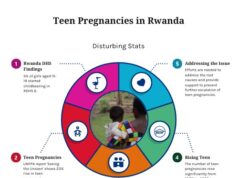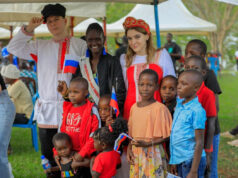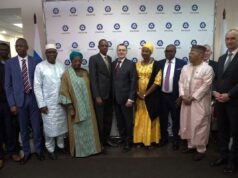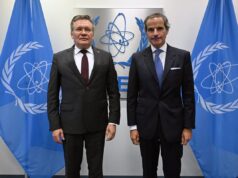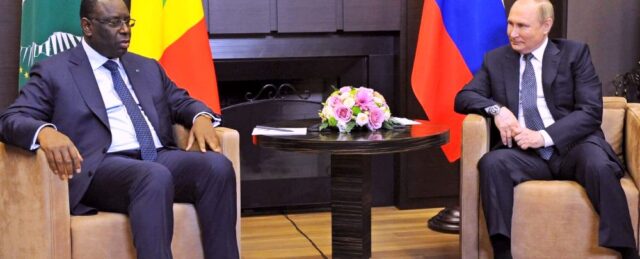
While Russia has little to offer Africa economically, the political incentives for Moscow to join the continent have only increased after its invasion of Ukraine.
As Russia seeks to escape international isolation following its invasion of Ukraine, the expansion of Russia’s economic commitments in Africa is becoming more important. The more active Russia is on the world stage, the more Moscow can project the image that it is sheltered from such pressures – and that it still has many friends.
Africa would then seem to offer promising prospects. More than in any other region, African governments have been reluctant to condemn Russia’s violation of its neighbor’s territorial integrity. And as the focus is on economic development, many say that Africa does not have the luxury of criticizing its potential economic partners.
It is therefore not surprising that Russia strongly promotes economic opportunities for Africa – raw materials sectors such as agriculture and hydrocarbons in technological fields such as energy, transport and digitization.
Russia’s broken economic promises
« Russian trade with Africa [ … ] has decreased every year since 2018 ».
Russia, however, faces many obstacles in its selling speech. To begin with, Russia’s GDP, which stands at $ 1.4 trillion, is equivalent to that of Brazil or Spain. It is expected to contract by 5.5% until 2023 and only regain its pre-war value in 2030. This development follows a 5.1% drop in GDP per capita between 2010 and 2020.
It is revealing that Russia invests little in Africa, contributing less than 1% to foreign direct investment ( FDI ) intended for the continent. This shows Russia’s limited commitment to Africa, which would be demonstrated by capital investments involving longer-term returns.
Russia’s economic commitments in Africa are rather based on trade. However, this trade is also modest, since it represents only $ 14 billion. ( By way of comparison, the value of African trade with the EU, China and the United States is 295 billion, 254 billion and 65 billion dollars respectively ). In addition, Russian exports to Africa are 7 times greater than African exports to Russia, which sets them apart from the more balanced trade portfolios of Africa’s main trading partners. African exports to Russia represent only 0.4% of Africa’s total and consist mainly of fresh products.
Russia mainly exports cereals, weapons, mining and nuclear power to Africa. However, more than 70% of all Russian trade with Africa is concentrated in only four countries : Egypt, Algeria, Morocco and South Africa.
At the Sochi summit in 2019, Russian President Vladimir Putin pledged to double the level of Russian trade with Africa in five years. Instead, it has declined every year since 2018, falling from 30% in total. In contrast, Russian trade worldwide had returned to its pre-pandemic level in 2021. This illustrates a Russian tendency to surprise and not keep its promises when it comes to its economic commitments in Africa.
Anyway, only geopolitics
Russia’s modest economic engagement in Africa may not be so important to Moscow in the end. Russia’s real motivations for engaging in Africa are to promote geostrategic interests – securing a foot in the Mediterranean on the southern border of NATO, shifting Western influence and normalizing the vision of the world of Russia. In other words, Africa is a means of achieving Russia’s broader strategic goals.
« With 54 votes in the United Nations General Assembly, Africa is an attractive target for the validation of … violations of international law by Russia ».
While Moscow welcomes the increase in business opportunities with Africa, the political benefits are most convincing. With 54 votes in the United Nations General Assembly, Africa is an attractive target for the validation of Russia’s military aggression and violations of international law.
In addition, Russia acquires most of its influence in Africa thanks to unconventional tools and asymmetrical that she uses including elite cooperation, misinformation, interference in elections, deployment of the Wagner paramilitary group and arms for resources contracts.
The dollar value of Russia’s economic engagement in Africa is less important than the fact that Moscow can say that it has dynamic links with a large circle of countries despite its international isolation.
The economic story of Russia in Africa
Therefore, it can be expected that Russia will actively praise its economic commitments in Africa, whether substantial or insignificant.
Most importantly, Africa depends on Russia for 30% of its grain supplies. Almost all of these exports ( 95% ) consists of wheat ( 11.9 MT ), for a value of $ 3.3 billion. 80 % of these wheat exports are destined for North Africa ( Algeria, Egypt, Libya, Morocco and Tunisia ), as well as in Nigeria, Ethiopia, Sudan and South Africa. Africa currently depends on imports for 63% of its wheat needs, a percentage that is expected to increase with the continent’s population growth.
Given the shock of food prices caused by the interruption of their supply by Russia, a key question will be whether these African countries will again allow themselves to go on such dependence on a single supplier.
Russia is also the first arms seller to Africa, controlling half of the market. While Russian weapons are sold to 14 African countries, Algeria, Egypt and Angola account for 94% of the value of arms sales in the region.
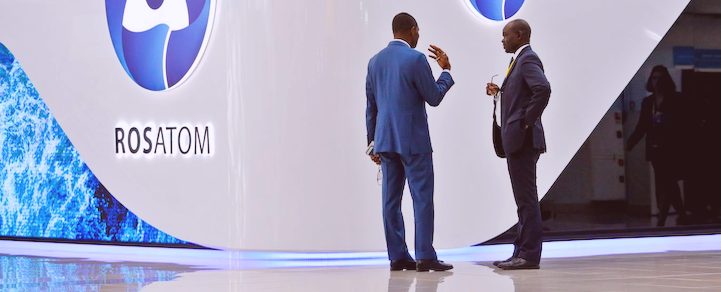
Rosatom in South Africa. ( Photo: Rosatom )
Russia has simultaneously expressed interest in investing in African oil and gas. However, most of these projects have not materialized. This has led some African analysts to suggest that Russia’s real goal is prevent African oil and gas from reaching the world market and threaten Russia’s market share.
Likewise, Russia is promoting the construction of nuclear power plants on the continent. In 2020, the Russian state-owned atomic energy company, Rosatom, obtained a $ 25 billion loan to begin construction of Egypt’s first nuclear power plant, a 4800 MW installation in El Dabaa. The total cost of the plant is $ 60 billion. Rosatom has signed cooperation agreements with 17 other African governments, including Ethiopia, Nigeria, Rwanda and Zambia. Given their costs, these nuclear agreements are not considered viable for most African countries. However, the huge expenses of these projects create many opportunities for corruption, generating political incentives for well-placed Kremlin officials and African governments.
Russia’s priority partners for its expansion in Africa
We can count on Russia to push its economic ties with Africa, even if they are modest. What will be the target of Russia ? At the top of the list, North Africa, given the geostrategic importance of this region for Moscow.
Another priority will be the influential African countries which, according to Moscow, can be drawn into its orbit. These include Ethiopia, South Africa, Nigeria, Senegal, the Democratic Republic of the Congo and Uganda.
Ethiopia, for example, is in the crosshairs of Moscow, which is trying to take advantage of Western criticism of the alleged human rights violations by Ethiopia in the context of the Tigray conflict. Given Ethiopia’s reconstruction imperative, however, foreign investment will be essential, to which the Russians cannot contribute.
Likewise, Russia will try to deepen its ties with South Africa, another member of the BRICS. The South African government has bowed in four for qualify the war in Ukraine in Moscow terms. The perception of political advantages linked to the deepening of ties can lead to an intensification of Russian economic activity in South Africa, even if it is not economically rational. Meanwhile, the five main sources of FDI in South Africa all come from the West.
In Uganda, the government accepted to exchange Russian military aid and propaganda against the injection of Russian messages regarding his war in Ukraine and other global issues on Ugandan state television.
If Russia’s economic promises in Africa sound hollow, the political incentives for engagement for Russia and some African governments are strong. So even if Russia offers little concrete economic benefits to Africa, we can expect to hear more.




